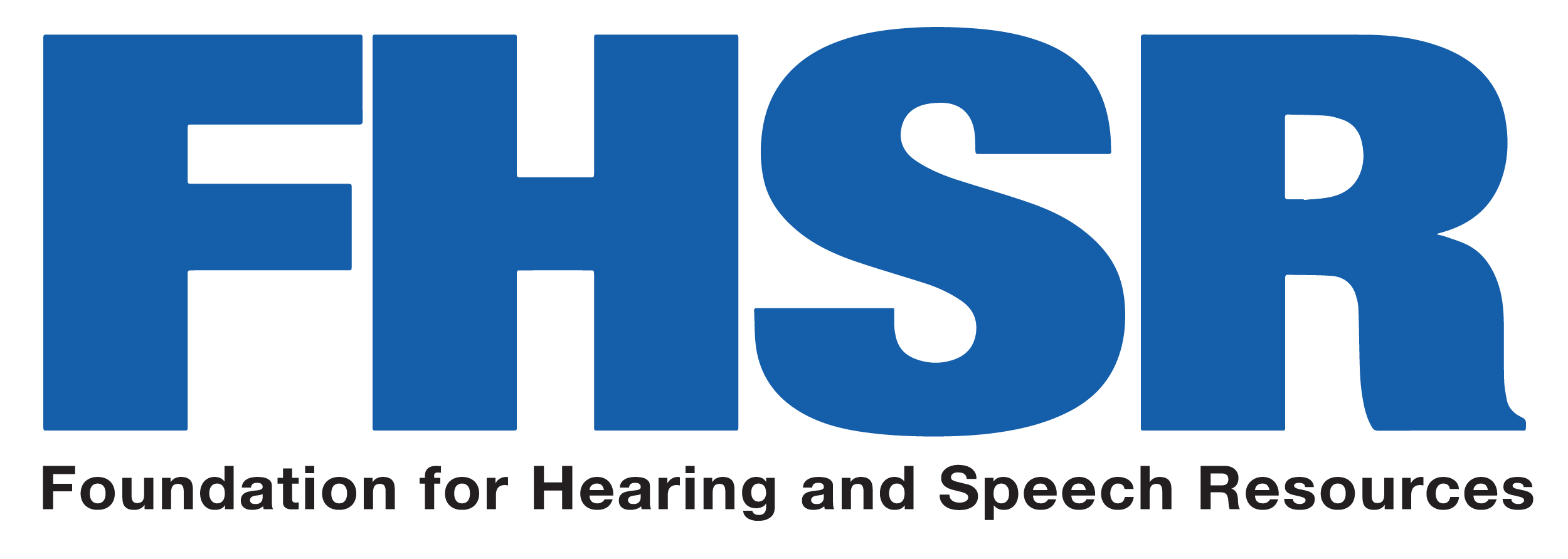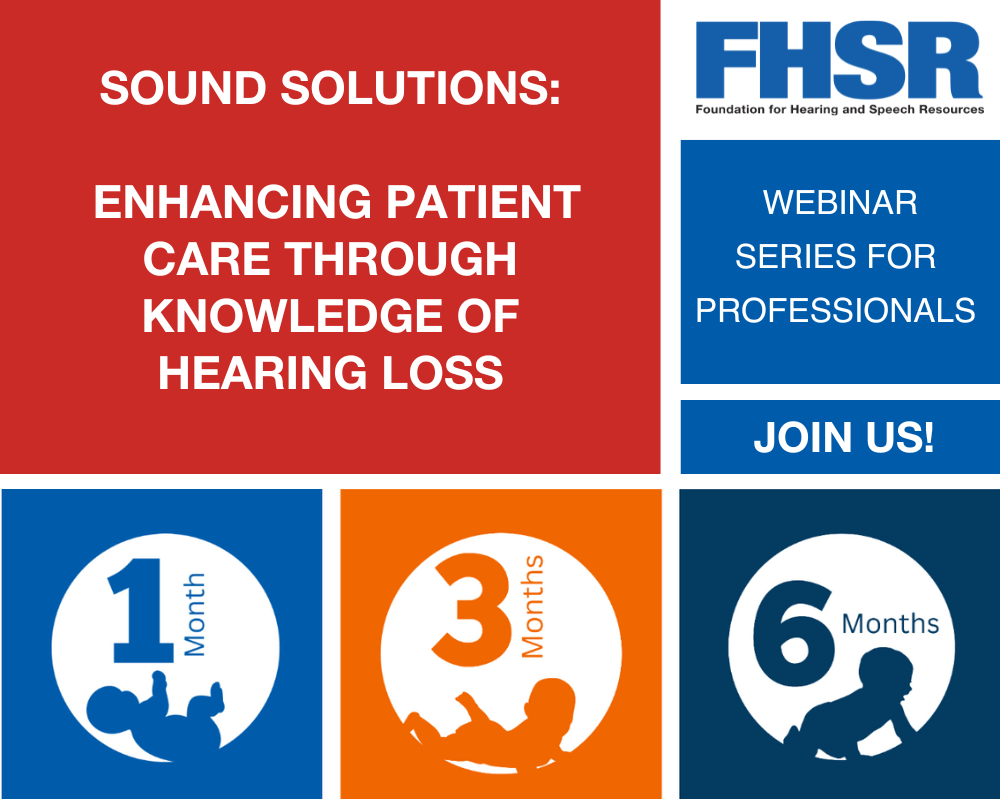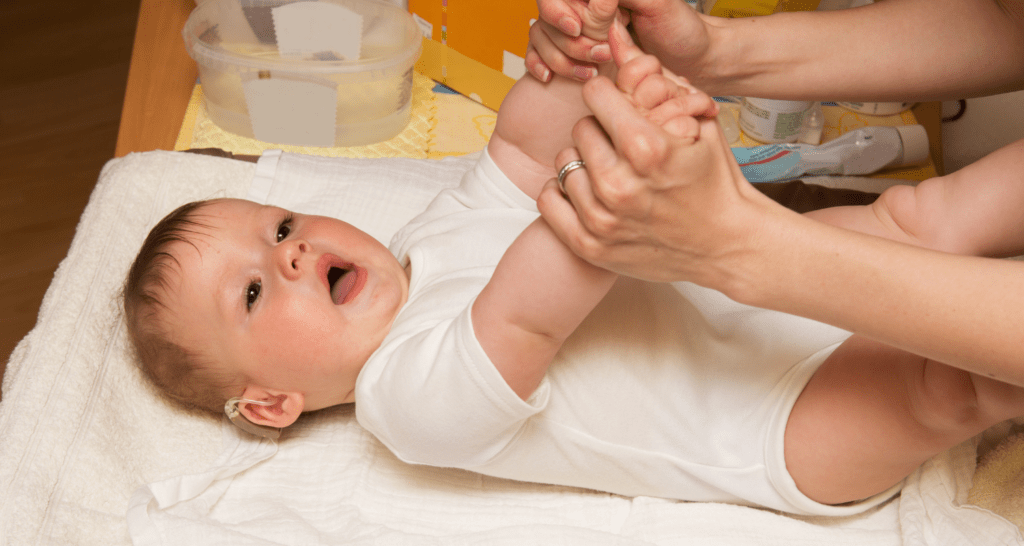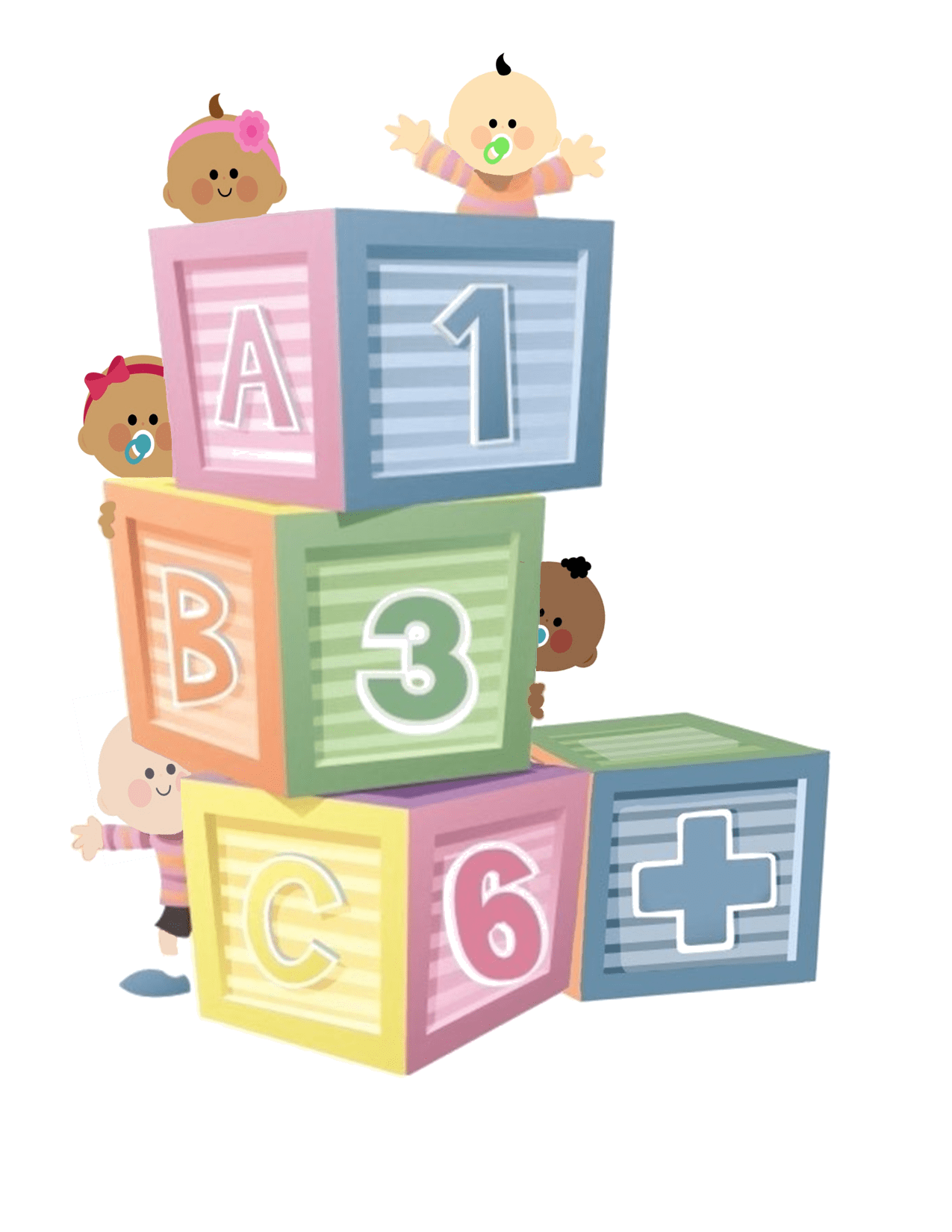NEXT STEPS AFTER A FAILED NEWBORN HEARING SCREENING
Sound Solutions:
Enhancing Patient Care through Knowledge of Hearing Loss
Having a baby is a wonderful event – and a busy time! One key test that happens the day after your baby is born in Illinois is the Newborn Hearing Screening. A hearing technician will come and take the baby for a painless hearing test to determine if the child potentially has hearing loss. Importantly, failing this test does not determine hearing loss, it merely says more in-depth testing is needed. Close to 90% of all babies who fail their Newborn Hearing Screening will in fact pass when they are re-tested. For the other 10%, not passing the follow-up could mean your baby has some level of hearing loss.
The second follow up screening is crucial to determine if your baby has hearing loss.
Babies come into this world and are immediately learning to communicate through their senses. Hearing plays a key role in their interaction with their new world. If a baby fails their hearing screening, it can be scary for new parents. FHSR has partnered with Illinois Early Hearing Detection & Intervention to help you understand the process and what to expect in the first 6 months of your baby’s life if they are diagnosed with hearing loss.
Of course, hearing loss can occur at any stage of a child’s life so it is important to monitor your child’s hearing and see a professional if you notice a change.
The Foundation for Hearing and Speech Resources strongly believes that an educated parent or caregiver is in the best position to support their baby on their hearing journey.

- Monday Feb 17th @ 5 pm
- Monday March 24th @ 12 pm
- Thursday March 27th @5 pm
This webinar is FREE to attend, but registration is required.
Secure your spot today by signing up.
Sound Solutions: Enhancing Patient Care through Knowledge of Hearing Loss
FHSR will be hosting an upcoming webinar focused on pediatric hearing loss, and we’re eager to engage healthcare professionals (hearing screeners, midwives, doulas, pediatricians, birthing nurses and nurse practitioners) in this important conversation.
The goal of this webinar is to increase awareness around the 1-3-6 program created by the Centers for Disease Control (CDC) and endorsed by the Illinois Department of Public Health (IDPH) so families of newborns and the professionals that serve them, have the key information on next steps when an infant has not passed their screening.
The webinar will provide valuable insights on identifying and addressing hearing loss in newborns – an essential topic for those involved in pediatric care. We believe the insights shared during the webinar will be beneficial for professionals in the field and can help drive positive outcomes for children with hearing loss.
We will be discussing:
- The importance of timely hearing screenings
- Effective intervention strategies
We believe the insights shared during the webinar will be beneficial for professionals in the field and can help drive positive outcomes for children with hearing loss.
Following the initial failed hearing screening at the hospital, it’s important for moms to ask for a Cytomegalovirus (CMV) screening test. CMV is actually the leading cause of permanent hearing loss and developmental disabilities. Children who have congenital CMV may actually benefit from an antiviral that must be given shortly after birth – so timing is everything.

UNDERSTANDING NEXT STEPS FOR FAILED HEARING SCREENINGS
SCREEN NO LATER THAN
1 MONTH
DIAGNOSE NO LATER THAN
3 MONTHS
EARLY INTERVENTION NO LATER THAN 6 MONTHS
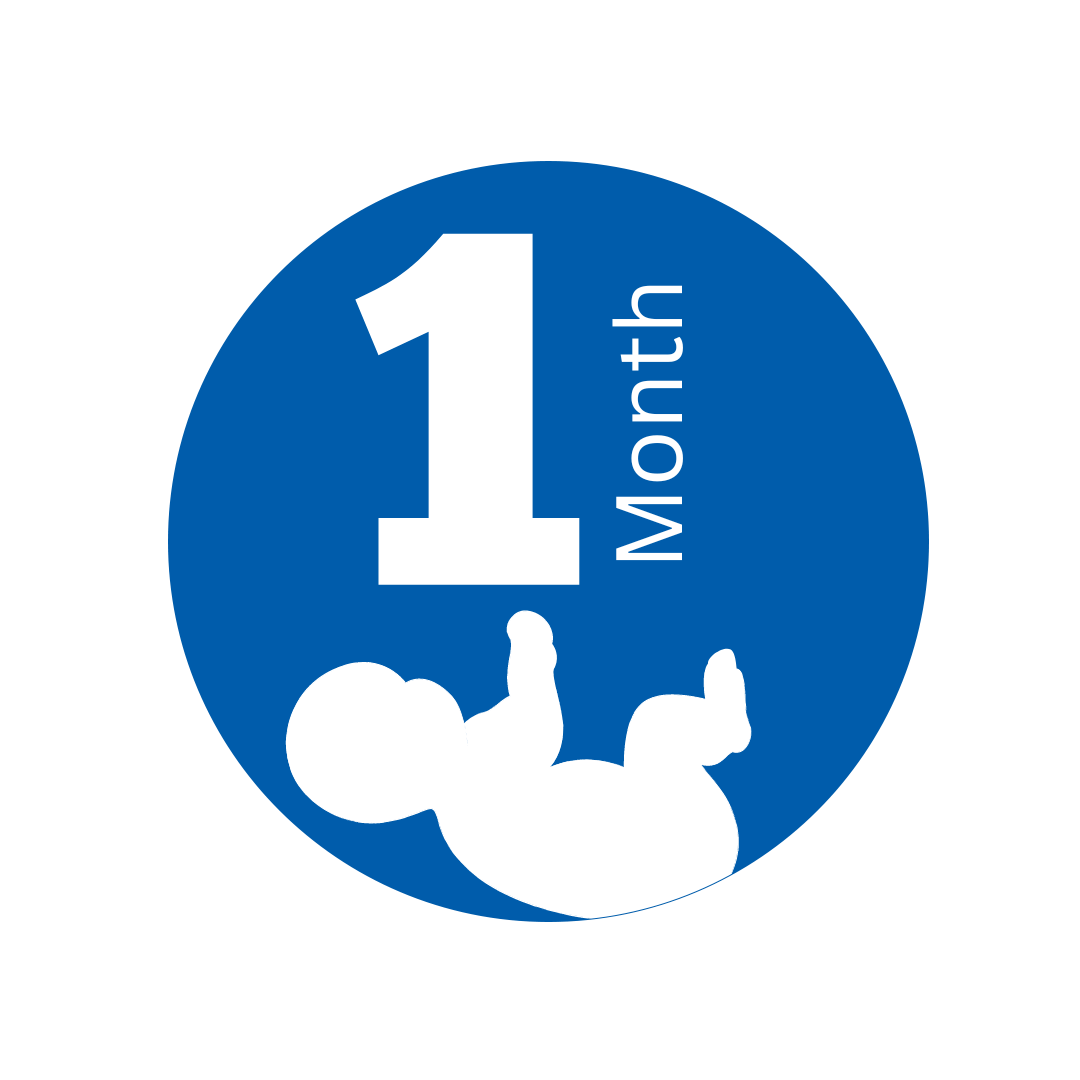
1 MONTH
If your baby fails their newborn hearing screening, it is important to locate a pediatric audiology clinic close to your home so you can schedule the follow up screening as soon as possible. (See our map to find a location near you.) Clinics can take a few weeks to a few months for appointments, so the sooner you act, the sooner you will be able to get the second test. Illinois Early Detection and Intervention – Next Steps, can be found HERE.
Once your appointment day arrives, it is nice to know what to expect. A second follow-up screening is conducted, but does not ultimately determine if there is a hearing loss. If a child continues to fail the screening, the baby will receive a diagnostic Auditory Brainstem Response (ABR) test at the clinic. This is a diagnostic test administered by a pediatric audiologist who has the training and proper equipment to perform the evaluation. The test can only be administered if the baby is still and quiet, so scheduling during sleep and nap time is the best time. Don’t forget to test both ears!
If the hearing loss is confirmed, you and your pediatric audiologist will need to start making a plan for next steps. They will most likely show you an Audiogram to describe the hearing loss level. This information will help you determine your path forward.,
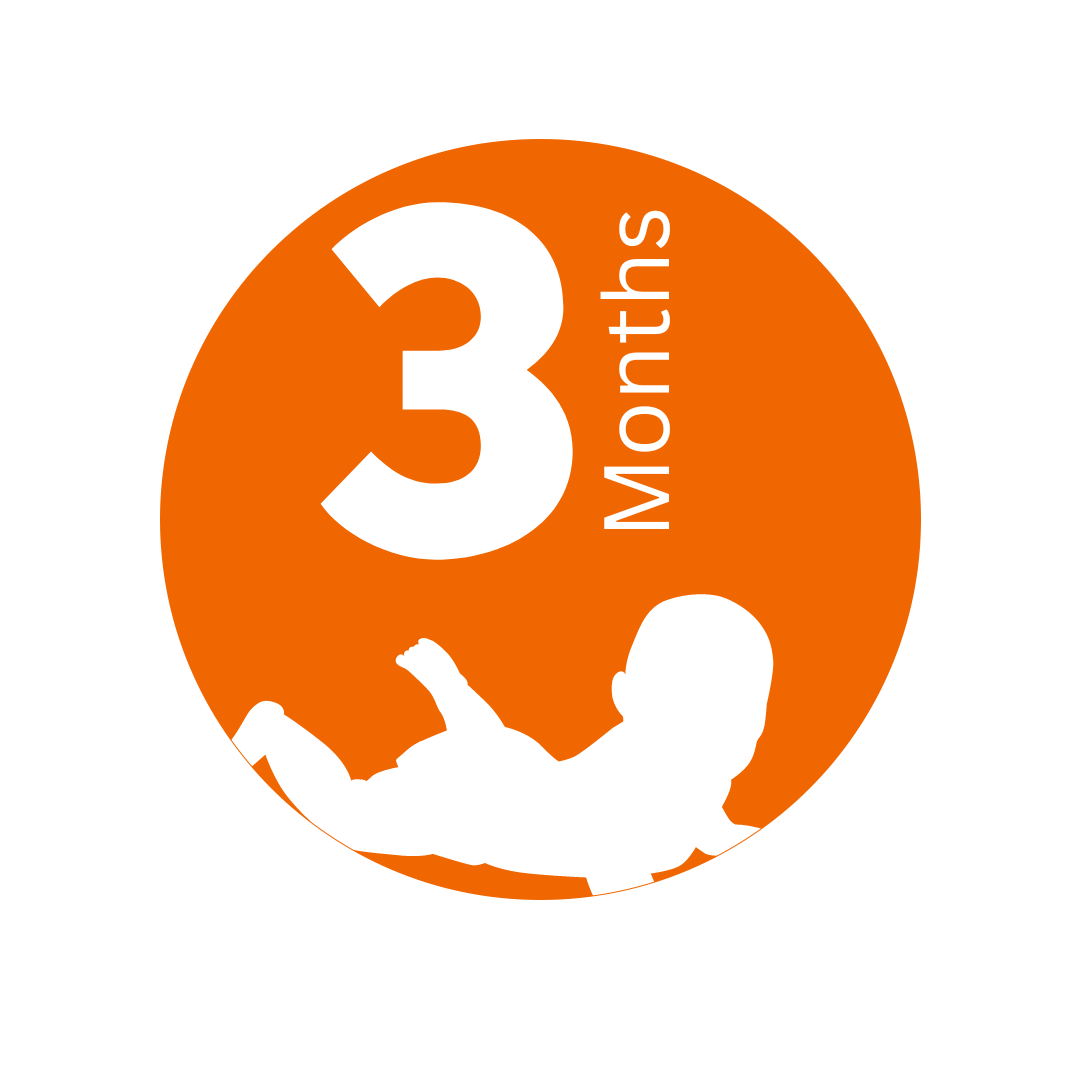
3 MONTH
Once your baby’s hearing loss has been confirmed, you will need to see a Pediatric ENT (an Ear, Nose and Throat doctor) so they can examine the baby’s ears and look for any physical issues that should be addressed. If an assistive hearing aid device is required for your child’s hearing loss, you will obtain clearance from an ENT and follow up with audiology. Your pediatric audiologist will fit your baby with hearing aids. Hearing aids amplify sounds and are programmed specifically for your baby’s hearing. For more information on types of hearing loss CLICK HERE.
In these next few months, there will be numerous appointments with your pediatric audiologist to make sure the hearing aids are programmed properly, or to continue the assessment process for cochlear implants. In addition, because babies grow so quickly in the early stages, earmolds will need to be remade often. Earmolds (or hearing molds) are used to hold the hearing aids in the baby’s ears, as well as ensuring sound is being delivered properly to the ear.
While it is a busy time with appointments, it is also the time to get your baby enrolled in Early Intervention with the goal of having their hearing team and plan in place by the baby’s 6-month birthday. Early Intervention is a service program provided by the State of Illinois for all babies born who need therapeutic services. The pediatric audiologist should refer you to the Early Intervention service coordinator who will schedule an intake session. The beauty of Early Intervention is that all service providers will come to the baby, either in your home or their daycare setting. And the services are on a sliding fee scale, so you only pay what you are able after insurance coverage.
For potential CI candidates, there’s a multitude of factors at play for how long the process takes. Hearing aid use, patient participation and enrollment in therapy are important factors in addition to insurance eligibility during the evaluation process. If an assistive hearing aid device is required for your child’s hearing loss, you will obtain clearance from an ENT and follow up with audiology. Your pediatric audiologist will fit your baby with hearing aids at this time.
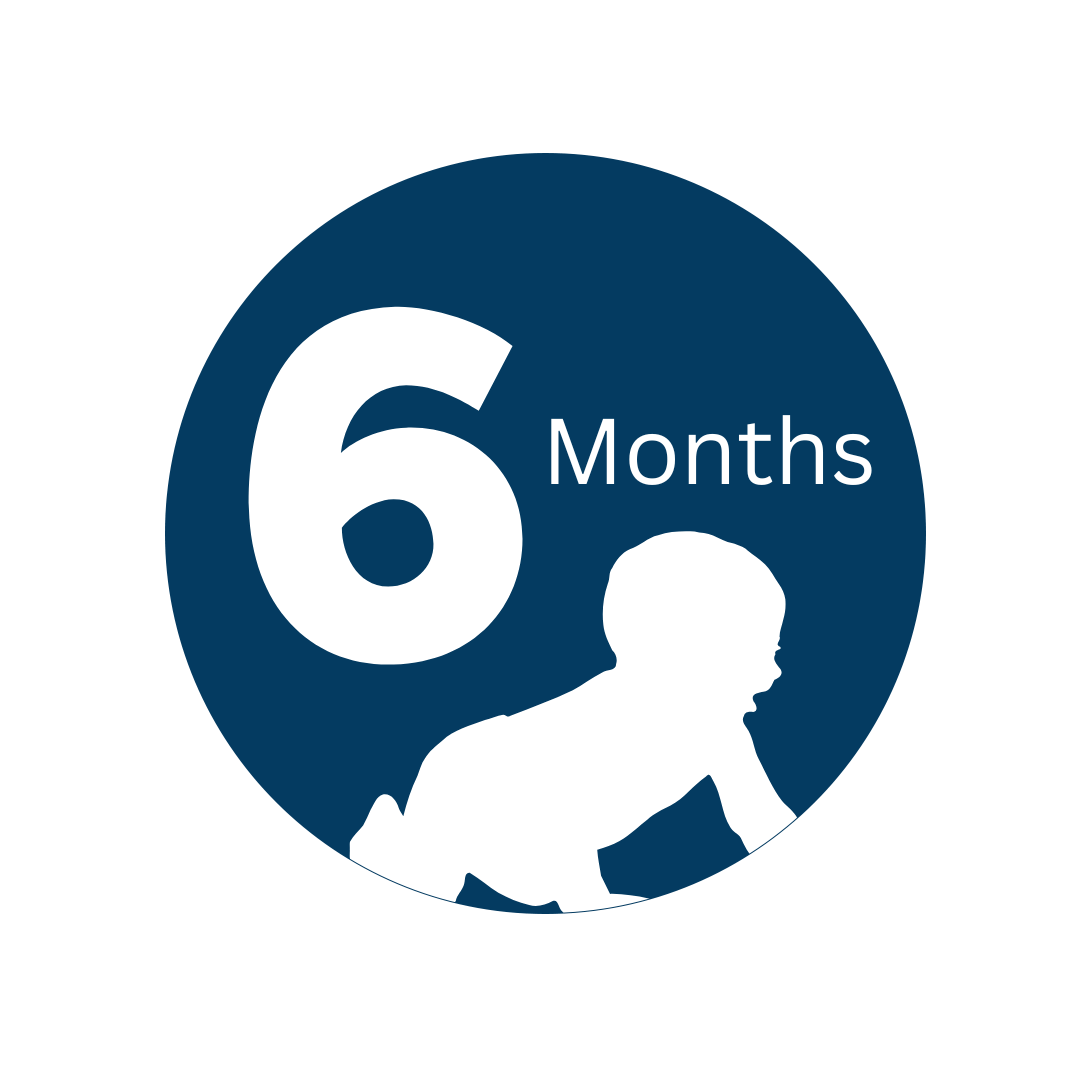
6 MONTH
The Illinois Early Intervention Program (EI) for children with hearing loss starts at birth and ends when your child turns 3. It is very important to enroll your child as quickly as possible to take full advantage of the services the State of Illinois provides. EI services are provided on a sliding fee scale, based on your families’ income and insurance.
For your baby’s initial evaluation, the EI service coordinator will most likely send a Speech Language Pathologist (SLP), a Developmental Therapist-Hearing (DT-H), a Physical Therapist (PT) and an Occupational Therapist (OT) who will each conduct their own tests with the baby to determine if their services are required. Minimally you will have a Speech Language Pathologist (SLP) who specializes in language acquisition and also may have a Developmental Therapist – Hearing (DT-H) who works specifically with children who have hearing loss. Your EI service coordinator will work to schedule follow-up with any additional evaluations your child may need and will create your Family Service Plan (FSP) based on the outcomes of these evaluations.
By participating in Early Intervention, your child will have a team to support them to create a path for lifetime success. Your EI service team will help your child with their social, emotional, cognitive, and behavioral development ultimately assisting them with being ready for Preschool or Kindergarten.
At 3 years of age, your child will transition into Pre-K, where services may be provided by your school. The EI service coordinator will work with your school to coordinate the transfer of service plan. We also encourage you to reach out to FHSR’s Education Coordinator for assistance in creating an IEP or 504 plan for school.
FIND A PEDIATRIC
AUDIOLOGY CLINIC
If your baby failed the newborn hearing screening, it’s important to schedule their followup hearing screening at a pediatric audiology clinic.
We have compiled a list of clinics that provide this service as well as additional audiology services your baby may need.
Studies show that babies who are deaf or hard of hearing have the best chance for language development when interventions begin by 6 months of age. The more language-rich environment your child is exposed to at home, daycare or out in the community, the easier they will develop their own language skills.
Creating a team that brings your pediatrician together with an audiologist and a pediatric otolaryngologist (also called an ENT, this a specialist focused on the inner workings of the ear) is the best way to build your child’s hearing journey. Working together, these providers will measure your child’s hearing abilities and recommend interventions, therapies and resources.
EHDI 2021 Annual Report
This report is the source for 1.3.6 action plan
BE A PART OF IT ALL.
Give the gift of hearing.
Every contribution to FHSR helps improve the lives of children with hearing loss.
We hope you will consider making a gift to support these children. Thank you!

